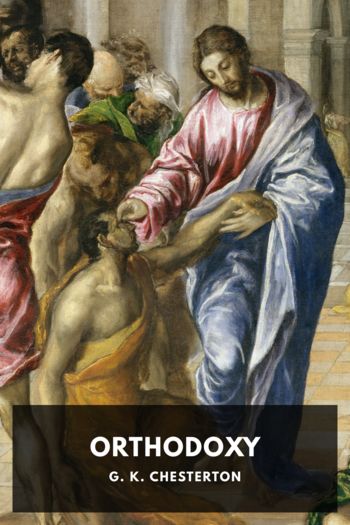Heretics - G. K. Chesterton (novels to improve english TXT) 📗

- Author: G. K. Chesterton
Book online «Heretics - G. K. Chesterton (novels to improve english TXT) 📗». Author G. K. Chesterton
By G. K. Chesterton.
Table of Contents Titlepage Imprint Dedication Heretics I: Introductory Remarks on the Importance of Orthodoxy II: On the Negative Spirit III: On Mr. Rudyard Kipling and Making the World Small IV: Mr. Bernard Shaw V: Mr. H. G. Wells and the Giants VI: Christmas and the Aesthetes VII: Omar and the Sacred Vine VIII: The Mildness of the Yellow Press IX: The Moods of Mr. George Moore X: On Sandals and Simplicity XI: Science and the Savages XII: Paganism and Mr. Lowes Dickinson XIII: Celts and Celtophiles XIV: On Certain Modern Writers and the Institution of the Family XV: On Smart Novelists and the Smart Set XVI: On Mr. McCabe and a Divine Frivolity XVII: On the Wit of Whistler XVIII: The Fallacy of the Young Nation XIX: Slum Novelists and the Slums XX: Concluding Remarks on the Importance of Orthodoxy Colophon Uncopyright ImprintThis ebook is the product of many hours of hard work by volunteers for Standard Ebooks, and builds on the hard work of other literature lovers made possible by the public domain.
This particular ebook is based on a transcription produced for Project Gutenberg and on digital scans available at the Internet Archive.
The writing and artwork within are believed to be in the U.S. public domain, and Standard Ebooks releases this ebook edition under the terms in the CC0 1.0 Universal Public Domain Dedication. For full license information, see the Uncopyright at the end of this ebook.
Standard Ebooks is a volunteer-driven project that produces ebook editions of public domain literature using modern typography, technology, and editorial standards, and distributes them free of cost. You can download this and other ebooks carefully produced for true book lovers at standardebooks.org.
To My Father
Heretics I Introductory Remarks on the Importance of OrthodoxyNothing more strangely indicates an enormous and silent evil of modern society than the extraordinary use which is made nowadays of the word “orthodox.” In former days the heretic was proud of not being a heretic. It was the kingdoms of the world and the police and the judges who were heretics. He was orthodox. He had no pride in having rebelled against them; they had rebelled against him. The armies with their cruel security, the kings with their cold faces, the decorous processes of State, the reasonable processes of law—all these like sheep had gone astray. The man was proud of being orthodox, was proud of being right. If he stood alone in a howling wilderness he was more than a man; he was a church. He was the centre of the universe; it was round him that the stars swung. All the tortures torn out of forgotten hells could not make him admit that he was heretical. But a few modern phrases have made him boast of it. He says, with a conscious laugh, “I suppose I am very heretical,” and looks round for applause. The word “heresy” not only means no longer being wrong; it practically means being clearheaded and courageous. The word “orthodoxy” not only no longer means being right; it practically means being wrong. All this can mean one thing, and one thing only. It means that people care less for whether they are philosophically right. For obviously a man ought to confess himself crazy before he confesses himself heretical. The Bohemian, with a red tie, ought to pique himself on his orthodoxy. The dynamiter, laying a bomb, ought to feel that, whatever else he is, at least he is orthodox.
It is foolish, generally speaking, for a philosopher to set fire to another philosopher in Smithfield Market because they do not agree in their theory of the universe. That was done very frequently in the last decadence of the Middle Ages, and it failed altogether in its object. But there is one thing that is infinitely more absurd and unpractical than burning a man for his philosophy. This is the habit of saying that his philosophy does not matter, and this is done universally in the twentieth century, in the decadence of the great revolutionary period. General theories are everywhere contemned; the doctrine of the Rights of Man is dismissed with the doctrine of the Fall of Man. Atheism itself is too theological for us today. Revolution itself is too much of a system; liberty itself is too much of a restraint. We will have no generalizations. Mr. Bernard Shaw has put the view in a perfect epigram: “The golden rule is that there is no golden rule.” We are more and more to discuss details in art, politics, literature. A man’s opinion on tramcars matters; his opinion on Botticelli matters; his opinion on all things does not matter. He may turn over and explore a million objects, but he must not find that strange object, the universe; for if he does he will have a religion, and be lost. Everything matters—except everything.
Examples are scarcely needed of this total levity on the subject of cosmic philosophy. Examples are scarcely needed to show that, whatever else we think of as affecting practical affairs, we do not think it matters whether a man is a pessimist or an optimist, a Cartesian or a Hegelian, a materialist or a spiritualist. Let me, however, take a random instance. At any innocent tea-table we may easily hear a man say, “Life is not worth living.” We regard it as we regard the statement that it is a fine day; nobody thinks that it can possibly have any serious effect on the man or on the world. And yet if that utterance were really believed, the world would stand on its head. Murderers would be given medals for





Comments (0)